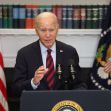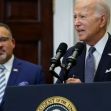Weeks after President Biden announced sweeping student debt cancellation for federal student loan borrowers, the lawsuits have begun trickling forward against what many have called a politically motivated stunt ahead of midterms.
Lawsuits have been filed across the nation by whole states as well as individual borrowers. These lawsuits have challenged the president's authority to use executive action on an issue that impacts a select group of Americans. Other lawsuits highlight the unfairness of such a measure as some Americans detail sacrifices they made to pay off their student loan debt while others seemingly took out student loans without having a viable plan in place to pay them back.
This hot-button issue has garnered the attention of nearly every American with both student borrowers and nonborrowers having an opinion on Biden’s plan of action for student loan relief. An estimated 13.5% of Americans have some amount of student loan debt, with borrowers aged 35 to 49 owing more than $6 billion collectively. As a nation, it's estimated that all federal borrowers still owe $1.6 trillion in student loan debt. According to the US Department of Education, if Biden's debt relief plan proves successful, it will cost the federal government an average of $30 billion over the next ten years.
The first lawsuit to challenge the President was brought forward by practicing attorney Frank Garrison. In his lawsuit, he names the U.S. Department of Education and the U.S. Secretary of Education, Miguel Cardona, as defendants.
His lawsuit details that canceling student loans for one group of Americans at the dime of taxpayer dollars is not only unfair but is burdensome and will cost him more come tax time. He explains that student debt that is canceled is considered taxable income and will have to have taxes paid on it. While guidelines under the pandemic-era American Rescue plan of 2021 detail that student loan borrowers wouldn't have to pay federal taxes on student debt, some states including Indiana where Garrison lives can impose taxes of their own.
His complaint details, “Under Indiana law, when Mr. Garrison receives $20,000 in automatic cancellation of his federal student loan debt, he will face a state income tax liability of more than $1,000 for 2022.” The suit adds, “ED’s loan cancellation will cause Mr. Garrison to incur a financial obligation that he would not otherwise have faced.”
Following Garrison's lawsuit, several other lawsuits have come into play including a suit brought forward by six republican-led states. These states include Arkansas, Iowa, Kansas, Missouri, Nebraska, and South Carolina. Their lawsuit aims to block student loan forgiveness with the crux of their argument being that the president does not have the authority to issue sweeping relief without the intervention of Congress.
Additionally, their lawsuit highlights that the sweeping cancellation negatively impacts private student loan companies as it would reduce their business.
A conservative Wisconsin law firm has also joined in on the national debate of forgiveness of student loan debt by filing a lawsuit of its own.
The Lawsuit was filed in the US District Court in Green Bay by the Wisconsin Institute for Law and Liberty, also known as WILL, on behalf of the Brown County Taxpayers Association. The lawsuit names President Biden and the US Education Department.
According to the conservative law group, using taxpayer money to pay back the debts of other borrowers is inherently unfair. The Brown County Taxpayers Association President Rich Heidel shared in a statement, “Student Loan Debt Relief takes from one group of people and arbitrarily distributes the spoils to another group." Heidle adds, "The Plan amounts to nothing more than a modern-day version of King George III’s Stamp Act where there was massive taxing and spending without participation of the People’s representatives."
As the lawsuits continue to trickle in, President Biden is facing hurdles of his own when it comes to implementing his promise of canceling $10,000 for every borrower, and up to $20,000 for Pell Grant recipients.
Initially, the Department of Education shared that loans which were guaranteed by the government but were held by private lenders were eligible for Biden’s student loan forgiveness plan. However, in a recent reversal, the Department of Education said that these privately-held loans must have been consolidated before September 29th to be found eligible for student loan relief. Following the announcement, the Department of Education shared that it would be “assessing whether there are alternative pathways” for borrowers who don't qualify for the relief under current guidelines.
For many, this reversal seems as arbitrary as the sweeping debt relief itself. For others, frustration begins to settle in as many borrowers who thought they would be eligible for student loan debt relief are now contemplating the reality that they might not be.






